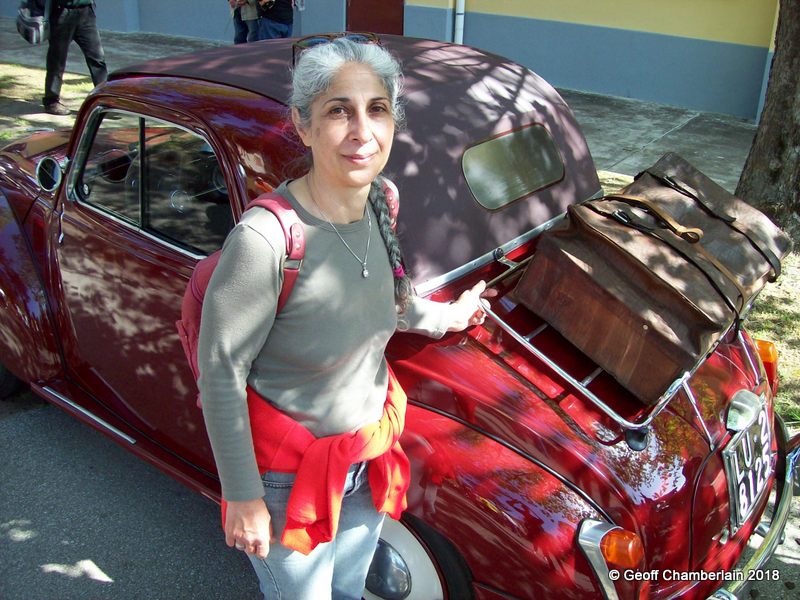Describing People’s Character In Italian – Part 1. Posted by Geoff on Oct 15, 2018 in Uncategorized
In Italian, we use a whole plethora of adjectives that describe people’s character. Several of these also happen to be ‘false friends’.
False friends, sometimes called false cognates, are words which look or sound similar in two different languages, leading us to the erroneous conclusion that they have the same meaning. Some of these are used to describe character. Here are four important ones:
1. simpatico/a/i/e – incorrect = sympathetic ✗ – correct = likeable ✓
examples:
conosci Patrizia? E’ un tipo molto simpatico = do you know Patrizia? she’s a really likeable type
Luciano e suo fratello sono proprio simpatici = Luciano and his brother are very likeable
The opposite of simpatico is antipatico, e.g.: quel tizio mi è proprio antipatico = I find that person really unpleasant
2. comprensivo/a/i/e – incorrect = comprehensive ✗ – correct = understanding ✓
examples:
direi che il mio dottore è una persona comprensiva = I’d say that my doctor is an understanding person
grazie, sei stato molto comprensivo = thanks, you’ve been very understanding
To say that someone is not understanding simply add non è or non sono, e.g.: Giorgio non è per niente un tipo comprensivo = Giorgio isn’t an understanding type at all
3. sensibile/i – incorrect = sensible ✗ – correct = sensitive ✓
examples:
a volte sei troppo sensibile = sometimes you’re too sensitive
in questo caso i medici non sono stati molto sensibili = in this case the doctors weren’t very sensitive
The opposite of sensibile is insensibile, e.g.: Carla è una ragazza piuttosto insensibile = Carla is quite an insensitive girl
4. educato/a/i/e – incorrect = educated ✗ – correct = polite, well mannered ✓
examples:
Paolo mi sembra molto educato = Paolo seems very polite
Le tue ragazze sono tutte e due educate = your little girls are both well mannered
The opposite of educato is maleducato, e.g.: il negoziante era molto maleducato = the shopkeeper was very rude
Many other adjectives that describe character look and sound similar in both Italian and English, and have the same meaning:
examples:
intelligente/i = intelligent
serio/a/i/e = serious
nervoso/a/i/e = nervous
calmo/a/i/e = calm
estroverso/a/i/e = extrovert
introverso/a/i/e = introvert
tranquillo/a/i/e = tranquil
… and so on …
But there are quite a few common ways of describing people’s character that have less obvious meanings. We’ll take look at these in part 2.
A Presto!

Build vocabulary, practice pronunciation, and more with Transparent Language Online. Available anytime, anywhere, on any device.





Comments:
Emmanuel Adesu:
Perfetto,Mi piace
Geoff:
@Emmanuel Adesu Bene, ne sono contento Emmanuel! A presto, Geoff 🙂
Jan:
Molto utile..grazie?
Geoff:
@Jan Prego! 🙂
Kaba Mballow:
Sono molto contento perche’ sto imparando piano, piano, io ho preso un po’ di tempo per imparare la lingua italiana quindi con questo post sto imparando la ringrazie.
Geoff:
@Kaba Mballow Sono contento anch’io Kaba. A presto! 🙂
Omar:
Thanks Your lessons are very helpful
Geoff:
@Omar Sei il benvenuto Omar! 🙂
Gianna Shaw:
Perfetto e molto utile. Queste frase non li fanno imparare in classe!
Anch’io qualche volta mi confondo con ‘sensible’.
Di nuove grazie
Geoff:
@Gianna Shaw Ciao Gianna, oh, those horrible words that end in e/i … you never know the gender! Such as: la frase (sing.) le frasi (plural).
Hence:
‘Queste frasi non le fanno imparare in classe!’
not
“Queste frase non li fanno imparare in classe!”
However, good try, and I did see your correction for ‘le’, well done!
A presto, Geoff 🙂
P.S. I’ve never understood why these essential phrases are omitted in classes … boh!
Remila:
That’s very useful…
Geoff:
@Remila Bene, ne sono contento Remila!
Saluti da Geoff 🙂
Gianna Shaw:
…. should be non ‘le’ fanno ….
mi sbaglio ?
Donna:
@Gianna Shaw Sono sempre quelle paroline che ci danno problemi no? Io avrei pensato che sarebbe “ne.” Comunque, c’è tanto da imparare da leggendo I commenti.
Geoff:
@Gianna Shaw ecco, brava! 🙂
William C Auge:
Cari amici, this my question; the caption for the photograph you referred to Serena as ” una ragazza molto simpatica”. I do not question that because I know it to be true. What I am wondering is it always OK to call an adult woman ragazza. In the U.S. many woman do not like to be called girl. I know Victoria feels very strongly about this.
Serena:
@William C Auge Ciao Bill!
Interesting question. When I read the caption written by Geoff, I was a bit surprised but, I must admit, also pleased by both the word ‘ragazza’ and the adjective ‘simpatica’. I don’t think that here in Italy calling an adult woman ‘ragazza’ has a negative connotation. In my yoga classes most of my students are older than me, however when they chat amongst themselves, they usually say things such as ‘… è una ragazza della mia età’, or ‘… è giovane, ha l’età mia’.
Tanti cari saluti da Serena
Laraine Philp:
Hi. I love receiving your Italian blogs. They are really helpful to me learning the Italian language. Thankyou.
Geoff:
@Laraine Philp Grazie tanto Laraine. Siamo molto contenti che trovi i blog d’aiuto. A presto! 🙂